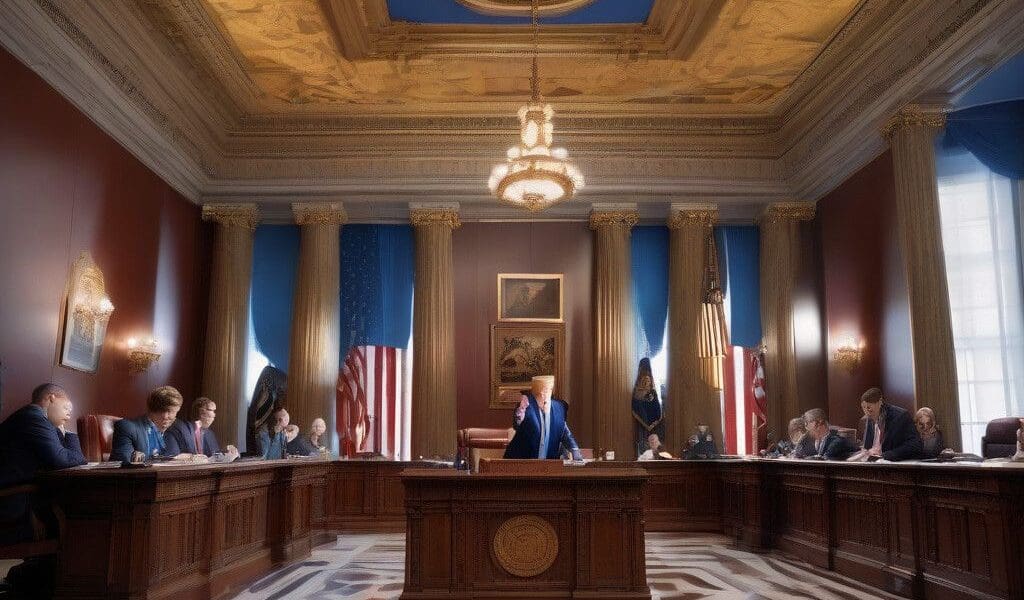US Senate Plans Bitcoin Reserve Under Trump
The prospect of a Bitcoin reserve in the United States is taking center stage as the US Senate prepares to position itself as a leader in cryptocurrency policy. Led by Senator Cynthia Lummis, the initiative aims to establish a strategic reserve of one million Bitcoins within the first 100 days of Donald Trump’s presidency. This ambitious proposal is not just a financial maneuver, but a pivotal step that could reshape the nation’s economic landscape.
The plan is being formalized under Lummis’s BITCOIN Act, which proposes the creation of decentralized vaults across various states. The goal is to securely store substantial amounts of Bitcoin, enhancing the country’s financial stability and credibility in the burgeoning cryptocurrency market. The proposed funding model leverages the revaluation of existing assets, such as gold certificates. By reallocating these resources, the Senate intends to bolster its Bitcoin purchases without putting additional strain on the nation’s finances.
Analysts within the cryptocurrency community are optimistic about the implications of this initiative. David Bailey, CEO of BTC Inc., has labeled the establishment of a Bitcoin reserve as potentially the most transformative policy on Trump’s agenda. This perspective underscores the belief that such a move could significantly accelerate Bitcoin’s growth, attracting considerable institutional interest. The initiative reflects a broader trend among nations to engage with digital currencies in ways that reimagine traditional fiscal policies.
The excitement surrounding this plan is not without merit. The price of Bitcoin has recently surged to unprecedented levels, reaching an all-time high of $93,000. Factors contributing to this rapid climb include Trump’s supportive stance on cryptocurrency and favorable market conditions driven by anticipated positive post-halving dynamics. The combination of political backing and robust market sentiment is shifting public perception regarding cryptocurrencies, framing them as viable investment assets.
Beyond merely securing Bitcoin, this policy could position the United States as a formidable player in the global financial ecosystem. Countries like El Salvador have already adopted Bitcoin as legal tender, highlighting a growing trend among nations seeking to harness the benefits of blockchain technology. The US’s move towards creating a Bitcoin reserve could similarly ignite interest from other states, sparking a potential competition for technological and financial superiority.
However, the plan is not without challenges. Establishing a decentralized vault system will require a carefully orchestrated network to ensure security and accessibility. Additionally, the fluctuating nature of Bitcoin’s value poses inherent risks. Critics might question whether the government should involve itself in the volatile cryptocurrency market, which has seen dramatic ups and downs.
Moreover, as the cryptocurrency landscape continues to evolve, regulatory scrutiny is likely to increase. Lummis’s initiative must navigate a complex web of existing laws and new regulations that could emerge as lawmakers and regulators catch up with the rapid pace of innovation in digital currencies.
The conversation around the Bitcoin reserve will also engage various stakeholders, from financial institutions to individual investors. The potential for creating a national Bitcoin reserve introduces a new layer of legitimacy to the cryptocurrency, appealing to those who previously viewed it with skepticism. Overall, this push towards a Bitcoin reserve reflects a significant shift in both policy and public perception of digital currencies, opening discussions on how traditional financial systems might adapt to these new realities.
In conclusion, the US Senate’s initiative to establish a Bitcoin reserve under Trump represents a bold step towards integrating cryptocurrency within the fabric of national economic policy. While there are obstacles to overcome, the potential benefits could redefine America’s financial landscape. As the nation explores this unprecedented opportunity, the eyes of the world will undoubtedly be focused on how the US navigates the intersection of traditional finance and cryptocurrency.








